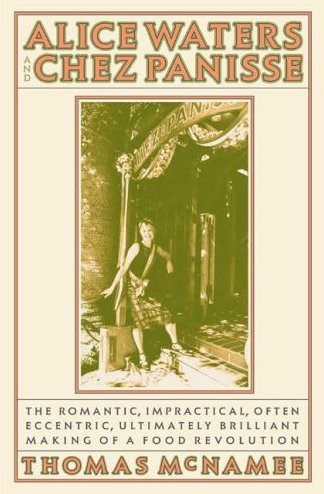
It would be easy to say that Alice Waters started her now famous Chez Panisse restaurant just so she could star in her own movie. That would be to ignore her generous impulse to gather friends together for conversation over good food.
Waters fled the turmoil of Vietnam war protests at UC Berkeley in the mid-60s for a year at the Sorbonne. That's where she discovered the glories of fresh local food, and the inexpensive bistro.
She certainly didn't intend to start a food revolution, but the revolution is in full swing today, with supermarket chains trying to lure back their picky shoppers with organic and fair trade foods, and an international Slow Food movement with 80,000 members.
Thomas McNamee is best known for his writing on the environment and the natural world. He does a superb job here of placing the neighborhood restaurant in the environment.
Alice's critics, some of whom worked in the restaurant, are apt to say she's impossible to work with because of her perfectionism about the food, the décor, the flowers. Others complain her only goal is to making money, but McNamee relates the struggles her investors have had to restrain her impulse to ignore the cost, so long as she got the very best to serve the customers. At times, she's been under orders from her financial advisors (including her father) to stop writing checks to charities: She ignored it. It took many years for the restaurant to turn a profit. Alice was always a reluctant cook, who much preferred talking to customers in the dining room. It looks as if getting her out of the kitchen and onto the international stage was the key to profitability.
When she opened Chez Panisse, Alice was in a relationship with Tom Luddy, a discerning film buff who now is co-director of the Telluride Film Festival. Not surprisingly, watching movies was part of the experience in the early days of Chez Panisse, when a full dinner cost $3.75. In fact, the whole venture is based on Marcel Pagnol's Provence trilogy, Marius, Fanny and César.
Her closest relationships have always been a major part of Alice's restaurant, even when the men were gay. Jeremiah Tower's stint in the kitchen created a more formal atmosphere; Fanny, her daughter with ex-husband Stephen Singer, inspired her campaigns for improved food in school lunches, and school gardens. Some friends have created businesses based on her needs, others have created restaurants, based on improving her model.
There are a few charming recipes (like baked goat cheese with garden lettuce, an herb omelette) and lots of gossip, but it's really all about passion, and the strange paths that can create.
Alice Waters and Chez Panisse: The Romantic, Impractical, Often Eccentric, Ultimately Brilliant Making of a Food Revolution. Thomas McNamee, Penguin Press, March, 2007.
E-mail Sophie Annan Jensen at This email address is being protected from spambots. You need JavaScript enabled to view it..
{mos_sb_discuss:5}